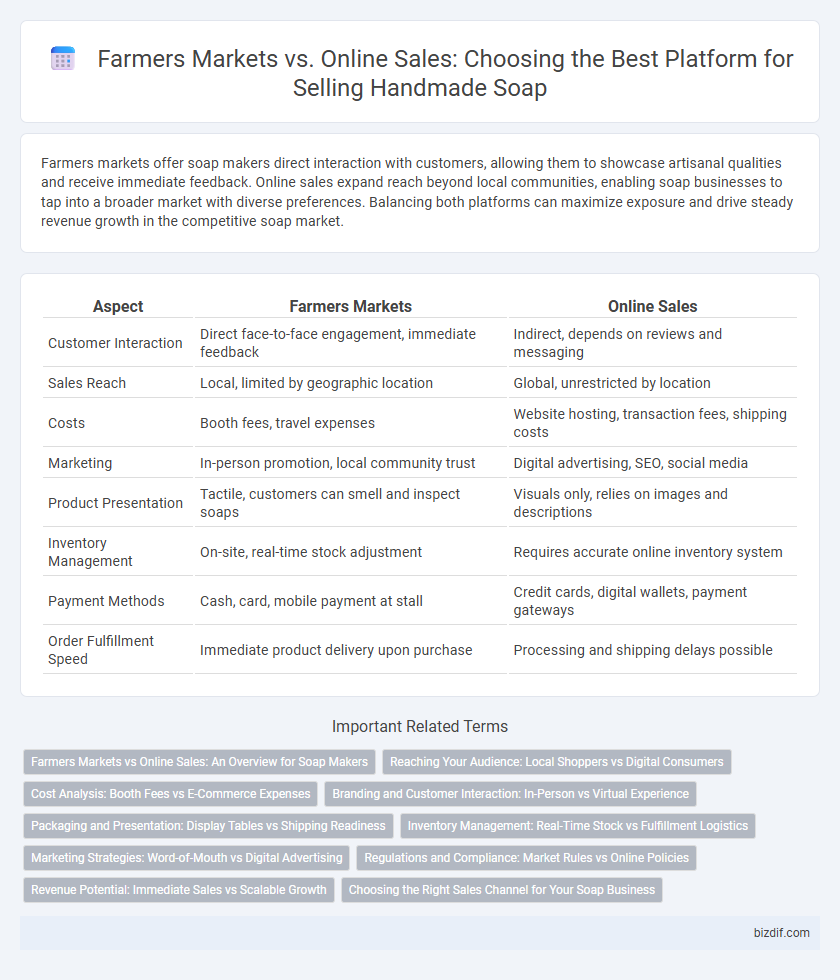Farmers markets offer soap makers direct interaction with customers, allowing them to showcase artisanal qualities and receive immediate feedback. Online sales expand reach beyond local communities, enabling soap businesses to tap into a broader market with diverse preferences. Balancing both platforms can maximize exposure and drive steady revenue growth in the competitive soap market.
Table of Comparison
| Aspect | Farmers Markets | Online Sales |
|---|---|---|
| Customer Interaction | Direct face-to-face engagement, immediate feedback | Indirect, depends on reviews and messaging |
| Sales Reach | Local, limited by geographic location | Global, unrestricted by location |
| Costs | Booth fees, travel expenses | Website hosting, transaction fees, shipping costs |
| Marketing | In-person promotion, local community trust | Digital advertising, SEO, social media |
| Product Presentation | Tactile, customers can smell and inspect soaps | Visuals only, relies on images and descriptions |
| Inventory Management | On-site, real-time stock adjustment | Requires accurate online inventory system |
| Payment Methods | Cash, card, mobile payment at stall | Credit cards, digital wallets, payment gateways |
| Order Fulfillment Speed | Immediate product delivery upon purchase | Processing and shipping delays possible |
Farmers Markets vs Online Sales: An Overview for Soap Makers
Farmers markets offer soap makers direct customer interaction, enabling immediate feedback and personalized product recommendations that boost brand loyalty. Online sales extend market reach globally, providing convenience and scalability through e-commerce platforms but require strategic digital marketing to stand out in a crowded marketplace. Balancing in-person sales at farmers markets with an optimized online presence maximizes revenue potential and brand visibility for soap makers.
Reaching Your Audience: Local Shoppers vs Digital Consumers
Farmers markets offer direct interaction with local shoppers who value handmade, artisanal soap and prefer buying from trusted community vendors. Online sales expand reach to digital consumers searching for niche, natural soap products and convenience, utilizing targeted ads and search engine optimization to drive traffic. Both channels require tailored marketing strategies to effectively engage their distinct audiences and maximize sales potential.
Cost Analysis: Booth Fees vs E-Commerce Expenses
Farmers markets typically charge booth fees ranging from $20 to $100 per day, creating upfront costs that can impact profit margins for soap makers. E-commerce expenses include platform fees, payment processing charges averaging 2.9% plus $0.30 per transaction, and costs for website hosting and digital marketing. Analyzing these expenses reveals that while farmers markets incur predictable daily fees, online sales require ongoing investment in technology and advertising to drive traffic and conversions.
Branding and Customer Interaction: In-Person vs Virtual Experience
Farmers markets offer soap makers direct customer interaction, allowing them to showcase product quality, share crafting stories, and build immediate brand trust through personal engagement. Online sales provide broader reach and consistent branding opportunities via curated websites and social media, yet lack the tactile experience and real-time feedback that in-person markets enable. Balancing both channels enhances brand visibility and cultivates diverse customer relationships through sensory experience and digital accessibility.
Packaging and Presentation: Display Tables vs Shipping Readiness
Farmers markets require soap packaging that is visually appealing and durable for face-to-face customer interaction, emphasizing attractive display tables and easy product access. Online sales demand packaging optimized for shipping readiness, including secure, protective materials to prevent damage during transit and clear labeling for brand visibility. Tailoring packaging and presentation strategies to each sales channel enhances customer experience and reduces product loss.
Inventory Management: Real-Time Stock vs Fulfillment Logistics
Farmers markets allow soap makers to manage inventory in real-time, directly adjusting stock based on immediate customer demand and reducing overproduction risks. Online sales require sophisticated fulfillment logistics, including accurate stock tracking across multiple platforms and timely order processing to prevent overselling. Efficient inventory management integrates point-of-sale data with warehouse systems to balance physical presence and digital orders in the soap making business.
Marketing Strategies: Word-of-Mouth vs Digital Advertising
Farmers markets excel in word-of-mouth marketing, leveraging face-to-face interactions to build trust and showcase soap quality through direct customer engagement. Online sales depend heavily on digital advertising strategies such as social media campaigns, search engine optimization, and targeted ads to reach a wider audience and drive traffic to e-commerce platforms. Combining personal testimonials from farmers markets with strong online presence amplifies brand credibility and expands customer base effectively.
Regulations and Compliance: Market Rules vs Online Policies
Farmers markets require soap makers to comply with local health regulations, permit acquisition, and product labeling standards specific to physical vendor stalls. Online sales demand adherence to e-commerce platform policies, shipping laws, and consumer protection regulations that vary by region and product category. Navigating both market rules and online policies ensures legal compliance and maximizes sales opportunities in the competitive soap-making industry.
Revenue Potential: Immediate Sales vs Scalable Growth
Farmers markets offer immediate sales with direct customer interactions, generating consistent daily revenue and instant feedback for soap makers. Online sales provide scalable growth opportunities through wider market reach and automated transactions, enabling higher long-term revenue potential. Balancing both channels maximizes profits by combining quick cash flow from local events with expansive e-commerce scalability.
Choosing the Right Sales Channel for Your Soap Business
Farmers markets offer direct customer interaction and immediate feedback, ideal for building local brand loyalty and testing new soap formulations. Online sales provide a broader reach and 24/7 availability, leveraging e-commerce platforms and social media marketing to scale your soap business. Evaluating target demographics, product presentation, and logistical capabilities ensures selecting the optimal sales channel for maximizing soap revenue and growth.
Farmers Markets vs Online Sales Infographic

 bizdif.com
bizdif.com